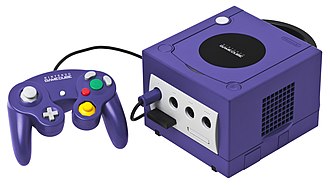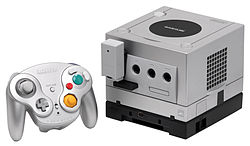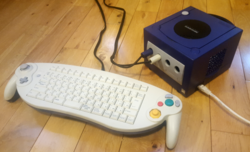GameCube
The Nintendo GameCube (also called GameCube, NGC, GCN, or GC for short) is the fourth home video game console made by Nintendo. The console was released on September 14, 2001 in Japan, November 18, 2001 in North America, May 3, 2002 in Europe, and May 17, 2002 in Australia. The GameCube sold 21.74 million units worldwide.
 An indigo GameCube with 251-block memory card inside (right) and GameCube controller | |
| Also known as | Dolphin (code name) |
|---|---|
| Developer | Nintendo |
| Manufacturer |
|
| Type | Home video game console |
| Generation | Sixth generation |
| Release date | September 14, 2001[1] NA |
| Retail availability | 2001–2007 |
| Introductory price | $199[2] |
| Discontinued | October 28, 2007 AUS |
| Units sold |
|
| Media |
|
| Operating system | Proprietary Nintendo operating system |
| Power |
|
| CPU | 32-bit IBM PowerPC 750CXe Gekko @ 486 MHz |
| Memory | |
| Removable storage | GameCube memory card (16 MB max. capacity) |
| Display |
|
| Graphics | ATI Flipper GPU @ 162 MHz with 3MB embedded 1T-SRAM |
| Sound | Analog stereo (Dolby Pro Logic II) |
| Controller input | GameCube controller, WaveBird, Game Boy Advance, various other input devices |
| Connectivity |
|
| Online services | |
| Dimensions | 150 × 161 × 110 mm[5] 5.9 × 6.3 × 4.3 in (width × depth × height) |
| Weight | 1,400 g[5] 3 lb. 1 oz. |
| Best-selling game | Super Smash Bros. Melee, Over 7 million [6] |
| Backward compatibility | Select Game Boy, Game Boy Color, and Game Boy Advance games via Game Boy Player |
| Predecessor | Nintendo 64 |
| Successor | Wii |
| Website | Official website |
The GameCube had many new features compared to the previous Nintendo video game console, the Nintendo 64. It was the first Nintendo console to support online gaming (playing together without wires). It could also connect to the Game Boy Player to play Game Boy, Game Boy Color, and Game Boy Advance games.
The GameCube was discontinued in early 2009 to focus production on the Wii and DS.[3] It was discontinued in Japan on October 28, 2007, Australia on December 3, 2007 and Europe on May 17, 2008. The last game for the console was Madden NFL 08 (also released for the Wii and Nintendo DS), which was released on August 14, 2007. However, first-party development (when the creator, Nintendo, was making games for the console) ended six months before that.
Nintendo's next console is called the Wii, released in 2006. The original model of the Wii is able to play games made for the GameCube.
Background
Nintendo was originally the most popular video game company. However, in the late 1990s, the PlayStation began to hurt Nintendo's business. For the first time, Nintendo's main console at the time, the Nintendo 64, was not the best-selling console.[7] It sold over thirty million units, which was good, but only half of what Nintendo's earlier NES did. Nintendo was starting to fear, but they decided to try again.
The GameCube was given lots more power than the Nintendo 64, as well as features that were used by other consoles before. Some of these features were games stored on discs, and memory cards used to store game data. The GameCube used more detailed 3D models, and Nintendo put new series of games on the system, along with sequels of past games.
Sales
In the end, the Nintendo GameCube did not do what Nintendo hoped it would do. It ended up selling just 21 million units, worse than the Nintendo 64.[8] The PlayStation 2 was already the most common game console to buy, simply because it could play DVDs and had many more games. Another reason the GameCube sold poorly is because it used special discs, which were smaller than discs with a normal size and could hold less data for the game developers to use. Another problem was how some people saw the GameCube; it looked like a toy to many young adults.
Description
Console
Like its name indicates, the GameCube is shaped like a cube. It also has a handle on the back. The original color of the console is purple, but different versions of the GameCube were made with different colors.
Controller
The GameCube's controllers have two analog joysticks. In many games, one of them is used to control a character, while the other is used to control the camera, or some other secondary function. In addition to the analog sticks and the directional pad (D-pad), there are eight buttons: A, B, Y, X, L, R, Z, and Start.
Nintendo later released a wireless version of the controller, called the WaveBird. Instead of wires, it used RF signals to communicate with the console and was powered by standard AA batteries.
Popular games
The Nintendo GameCube was known for its popular first-party games (the ones also made by its creator, Nintendo), including:
- Luigi's Mansion
- Metroid Prime and Metroid Prime 2: Echoes
- Pikmin and Pikmin 2
- Super Smash Bros. Melee
- The Legend of Zelda: The Wind Waker
- Super Mario Sunshine
- The Legend of Zelda: Twilight Princess
- Mario Party 4, Mario Party 5, Mario Party 6, and Mario Party 7
- Mario Kart: Double Dash!!
- Wave Race Blue Storm
GameCube Media
A group of schoolchildren exercise while playing Mario Kart: Double Dash!! on the GameCube in Hilton, Derbyshire.
A Platinum GameCube with a WaveBird Wireless Controller and Game Boy Player attached
GameCube – Game Boy Advance link cable, used for connecting a GBA to the GameCube console. Very few games actually implemented this accessory.
GameCube has a broadband adapter and ethernet cable. ASCII Corporation produced a keyboard for Phantasy Star Online.
References
- ↑ Martyn Williams (August 24, 2001). "Nintendo unveils Gamecube launch plans". CNN. Retrieved March 16, 2013.
- ↑ "Nintendo sets GameCube price - May 21, 2001". money.cnn.com.
- ↑ 3.0 3.1 "Consolidated Sales Transition by Region" (PDF). Nintendo. 2008-07-30. Archived from the original (PDF) on September 10, 2008. Retrieved 2008-07-30.
- ↑ "Nintendo Jumps Online - IGN". 13 May 2002 – via www.ign.com.
- ↑ 5.0 5.1 ニンテンドーゲームキューブ取扱説明書. Nintendo. p. 36.
- ↑ Nintendo (March 10, 2008). "At Long Last, Nintendo Proclaims: Let the Brawls Begin on Wii!". Press release. https://www.nintendo.com/whatsnew/detail/1u0FthaPxTSSeJelWm4Jt8TI0VJlTt5j. Retrieved March 11, 2008. "The previous installment in the series, Super Smash Bros. Melee, is the best-selling game for Nintendo GameCube with 7.09 million copies sold worldwide."
- ↑ Minotti, Mike. "Here's who won each console war". VentureBeat. Retrieved 8 October 2023.
- ↑ Bonthuys, Darryn. "The Nintendo GameCube Is Twenty Years Old Today". GameSpot. Retrieved 8 October 2023.
Notes
- ↑ Requires the use of the Digital AV port, which was removed from later models






